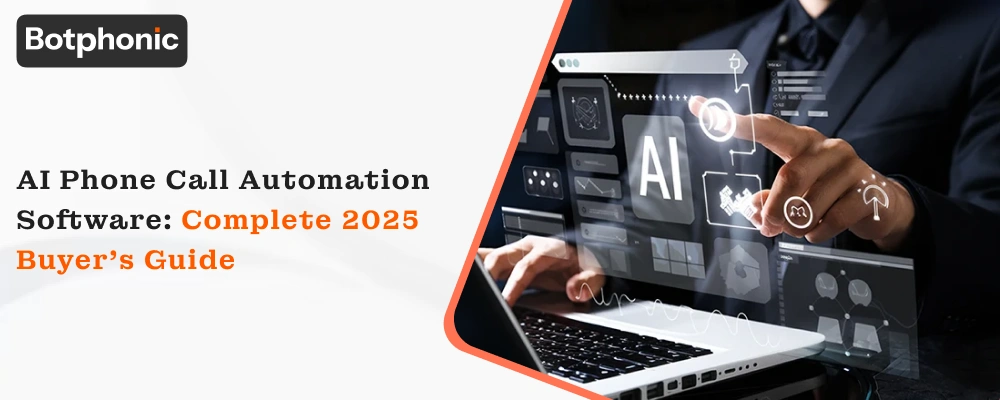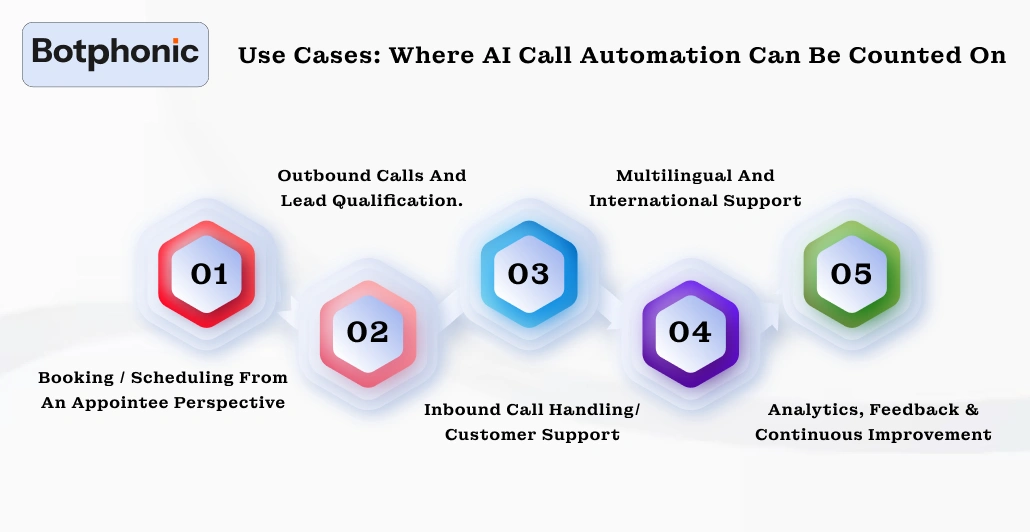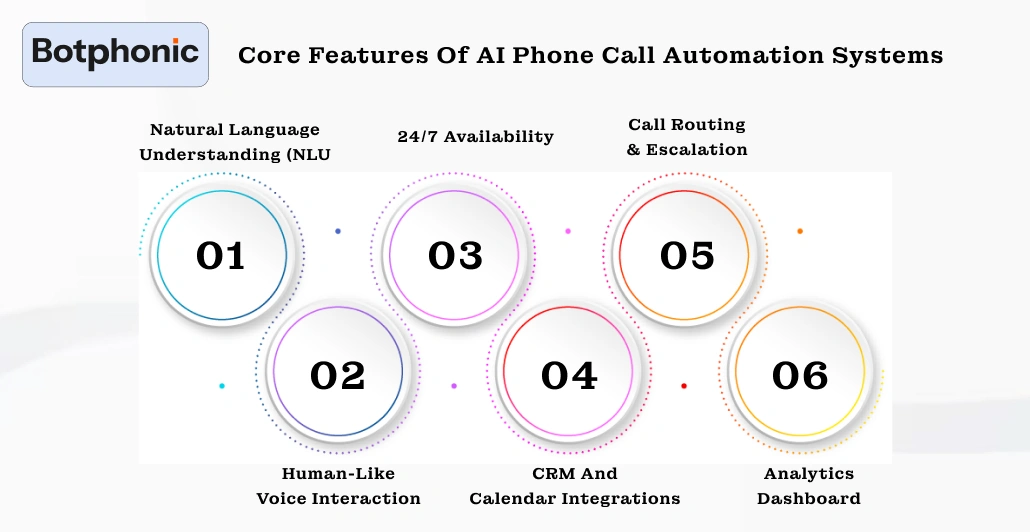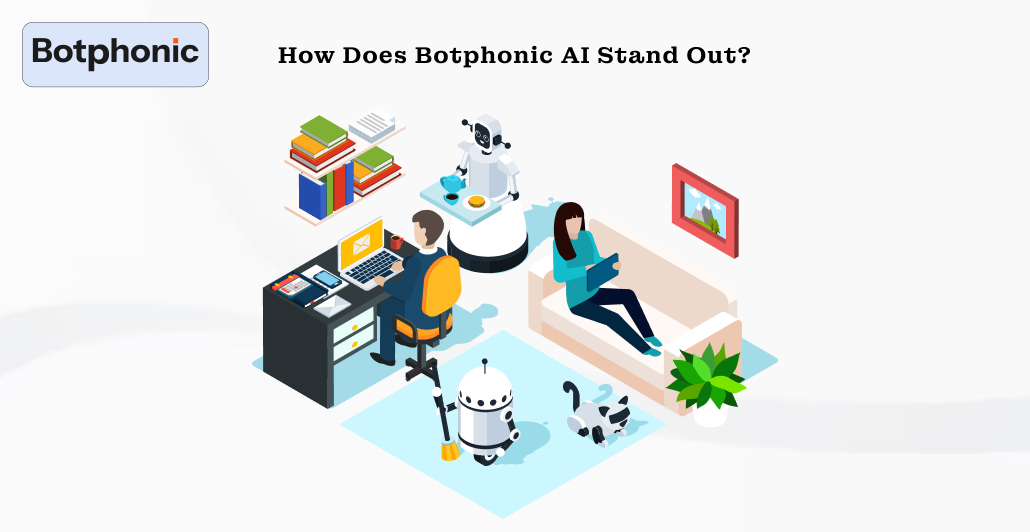
Summarize Content With:
Summary
This guide covers the meaning of “ai phone call automation software“ in detail, why your business needs such a system urgently, how to judge it, how the Botphonic AI solution matches, and how to select and implement the appropriate system.
Key Takeaways
- AI phone call automation radically changes the way you manage both inbound/outbound calls, as well as bookings.
- Examine the features, cost, integration, scalability, and business fit in detail before making a purchase.
- Botphonic.AI offers a software solution that features a human-like voice automated system, 24/7 call handling, and appointment booking capabilities.
- You can decide on, execute, and evaluate the performance of your AI call assistant with the help of a well-defined process.
Introduction
Imagine your phone never rings unanswered. Your company never failed to secure an appointment. Your workers were not busy with repetitive tasks. That’s the promise of AI phone call automation software in 2025.
Increasingly, businesses are realising that staff-only call handling is no longer sufficient, as they miss leads, lose bookings, and ultimately end up with dissatisfied customers. So, what you really need is a device that picks up the phone, verifies the leads, and schedules the appointments automatically. It is necessary to commit oneself to the automation process.
You need an AI call assistant even if you are asleep. This buyer’s guide is a journey through unpacking this technology, including the consideration criteria, the Botphonic AI solution, and the process of selecting and deploying your tool. Shall we?
To explore how this innovation is evolving, consider the AI Voice Call Assistant, which provides a detailed overview of the capabilities and business value of AI-powered voice systems.
What is AI Phone Call Automation Software?
AI phone call automation software merges technologies such as artificial intelligence, voice automation, and telephony to handle customer or prospect phone conversations. It relies on an AI voice agent (an “AI call assistant”) capable of various tasks, such as answering incoming calls, initiating outbound calls, asking questions, intelligently responding, booking appointments, routing conversations, summarising calls, collecting feedback, and much more.
For instance, businesses can automate both incoming and outgoing calls with Botphonic AI’s solution. This kind of tool does more than just use IVR or call redirection. In addition to integrating with calendars or CRMs, it utilises voice synthesis, natural language processing, and call routing logic.
Furthermore, it enhances the “AI booking” use case, in which the AI assistant arranges meetings on behalf of your business. For example, Botphonic’s site describes “automated scheduling” as its main functionality.
By shifting from traditional manual call handling to smart automation, you can enjoy an array of advantages, such as:
- The number of calls that you do not answer and, consequently, the leads that you miss are minimised.
- You expand your telephone presence further without increasing your workforce.
- You provide consistent answers at any time of the day or night.
- Moreover, you can extract the vital data from the calls you have with your clients.
- Moreover, you can extract crucial information from the phone calls you have with your customers.
Additionally, it enables your team to focus on high-value tasks.
Use Cases: Where AI Call Automation Can Be Counted On

We shall consider some real-life situations where the AI phone call automation software excels. We also mention the specific use cases of Botphonic.
1. Booking / Scheduling from an appointee perspective
If your business relies on scheduled appointments, such as healthcare clinics, hairdressing salons, or real estate tours, phone booking automation will save time and minimise missed opportunities. Botphonic is encouraged in medical practice, where AI voice assistants manage appointment bookings and patient requests.
Upon making a phone call, the AI will respond, offer available times, reserve the slot, and send the reminders. It can also replan or cancel. This reduces administrative burden.
2. Outbound Calls and Lead Qualification.
Many businesses maintain lists of prospects, but establishing human contact can be time-consuming. The AI call assistant strategy: the platform calls the prospect, answers as a human, gets them talking naturally, asks typical questions, and hands the good leads to the right people. Botphonic automates lead follow-up from a CSV or Google Sheet, allowing contacts to be reached at their convenience.
As an illustration, the real estate agents utilising the Botphonic real estate assistant have the advantage of constant contact, automatic follow-ups and scheduled property visits. Learn more about how advanced automation improves engagement quality through Conversational AI Phone Calls.
3. Inbound Call Handling/ Customer Support.
Inbound calls are also filled with repetitive questions: ‘What time do you open?’ ‘Can I book?’ and ‘I need help with my order.’ These can be automatically answered by an AI phone call automation system, automatically routed to humans on more complicated issues, or even automatically logged in information about tickets.
According to Botphonic, its AI will minimise duplication of tasks and boost the team’s productivity.
Botphonic
4. Multilingual and International Support
For a company operating in multiple countries or targeting diverse language groups, it is essential to have voice automation capable of handling multilingual conversations. According to Botphonic, “multi-lingual skills to converse with any customer of any city” is their key feature.
5. Analytics, Feedback & Continuous Improvement
Automation is not just about handling more calls; it also generates valuable data, including call transcripts, sentiment analysis, and conversion metrics. These allow you to work continuously on your product or service. Botphonic offers conversation analytics and feedback collection.
Core Features of AI Phone Call Automation Systems

By incorporating advanced voice technology, artificial intelligence, and real-time analytics, AI phone call automation software enables businesses to automate customer interactions at scale. These features are key to the AI-driven call automation solutions of 2025.
1. Natural Language Understanding (NLU)
At the core of conversational AI is NLU, or natural language understanding. With this, the system can understand human speech in a very natural way; it not only looks at words but also the meaning behind them.
NLU enables the AI to interact with customers in a lively manner, grasp different accents, and adapt to the language used in the conversation, rather than following set scripts.
Example:
“Can I book a slot for next Friday afternoon?” A customer utters this, and the AI understands it as a request for scheduling, selects the date and time, and checks the availability independently, thus providing the answer without any confusion.
2. Human-Like Voice Interaction
Customer engagement revolves around the voice. To this end, advanced voice synthesis and speech generation produce AI voices that are remarkably close to natural ones, even exhibiting qualities such as friendliness and empathy.
Contemporary AI voices even interact with humans by having human mannerisms, like pauses, changes in emotions, and tone levels, resulting in a conversational experience that is not artificial or robotic.
3. 24/7 Availability
Automation through AI calls does not require rest, meals, or vacations, and thus, the service that a business renders to its customers is not interrupted, and it is at their disposal all day long. Be it 2 p.m. or 2 a.m., all calls and inquiries are met instantly and in equal measure.
Example:
An AI system that assists a healthcare clinic in handling requests for appointments after office hours can make sure that no patient is left waiting for the following day.
4. CRM and Calendar Integrations
The advanced AI phone network easily works with leading CRMs (like HubSpot, Salesforce, or Zoho) and calendar applications (like Google Calendar or Outlook).
Such an arrangement makes it possible for every chat, appointment, or customer record update to be automatically documented and coordinated between the different tools, thus freeing the user from manual input mistakes.
It is able to produce an entirely automated workflow from start to finish.
5. Call Routing & Escalation
Even AI, which is brilliant, has a boundary to its understanding. When the machine faces complex or sensitive topics, it hands over the call to a suitable human worker – this transition is smooth, and the AI keeps the context intact.
So, with this smart escalation feature, the customer will not have to repeat their problem for the nth time.
Example:
In case a customer utters the words, “I want to discuss my billing dispute,” AI understands that it’s a case with high priority and therefore reroutes the call to the finance team. Besides, it shares a brief of the conversation along with it.
6. Analytics Dashboard
Handling calls through AI is just one part of the story. The system is also a goldmine of information in disguise.
The comprehensive analytics dashboard keeps track of various aspects of customer calls, such as call volume, average time to respond, booking rates, sentiment analysis, etc. Besides, it also shows the performance trends, which the managers can use to fine-tune their strategies.
Example:
The analytics interface of Botphonic is all about visually presenting data regarding, for example, the number of calls that turned into appointments, the busiest time slots, and the most spoken words by customers.
How Does Botphonic AI Stand Out?

Since you plan to feature content for botphonic.ai, here is a clear breakdown of how the solution meets the needs discussed above and what makes it attractive to buyers.
What Botphonic Offers
- The “Smart AI-Powered Call Assistant” from Botphonic promises to answer calls, automate scheduling, and improve operational performance.
- Their “AI phone call assistant” page mentions inbound/outbound call handling, routing calls, summarising conversations, qualifying leads and automating sales activities.
- They support multiple industries: healthcare (with appointment booking, multilingual voice), Botphonic, and real estate (lead generation, property visit scheduling).
- They highlight key features: human-AI conversation, sentiment analysis, conversation analytics, multilingual support, and scalability.
Why That Matters
- Because calls still convert. A human-like voice presence on the phone builds trust and reduces the barrier for booking or inquiry.
- Because businesses often lean heavily on telephone outreach and booking, automating this frees resources.
- Because 24/7 availability and multilingual support open new markets and reduce missed leads.
- Analytics and data from calls help you improve your business and forecast demand.
Get on with the AI booking features of Botphonic AI and be the one to start the appointment automation trend.
Try it Today!Final Thoughts
Simply put, AI phone call automation software powered by AI is a must-have if you are still thinking about keeping your phone leads, bookings, and customer calls. Your business will be the winner of the game with fewer missed calls, more booking throughput, availability worldwide, and data-driven insights. The tool you choose should be the right fit for your use cases, connect with your systems, grow with your business, and give you quantifiable results.
This market is well-suited for botphonic AI. Actual voice automation, inbound and outbound call compatibility, AI booking, language support, and actual integrations are all included. Through the phone, it gives you the ability to enhance customer satisfaction and operational effectiveness.

